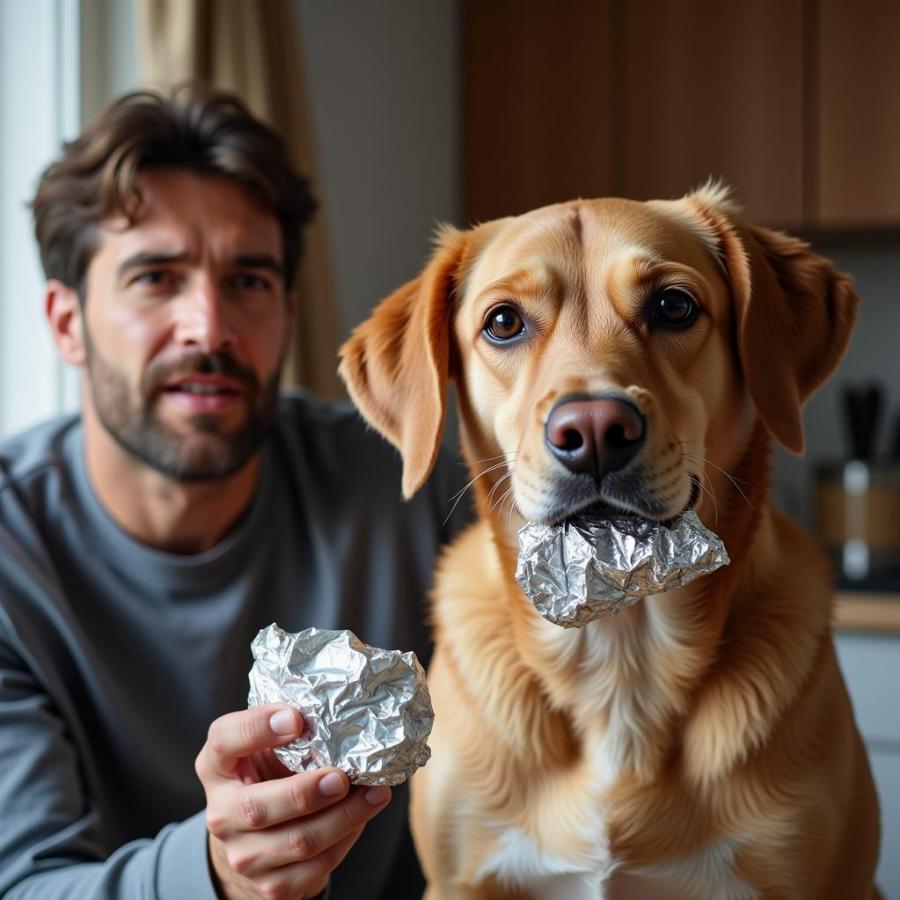If your dog ate tin foil, you’re likely worried. This article addresses your concerns, providing expert advice on what to do when your dog ingests aluminum foil, potential risks, and how to prevent future incidents. We’ll cover everything from immediate actions to long-term preventative measures, ensuring you’re equipped to handle this stressful situation.
Why is Tin Foil Dangerous for Dogs?
Tin foil, or aluminum foil, presents several dangers to dogs. While small amounts might pass through without incident, larger quantities can cause serious issues. The sharp edges can irritate or cut the mouth, esophagus, and stomach lining. Additionally, tin foil can obstruct the digestive tract, leading to vomiting, constipation, or in severe cases, a life-threatening blockage requiring surgery.
 Dog swallowing tin foil
Dog swallowing tin foil
What to Do if Your Dog Ate Tin Foil
If you witness your dog eating tin foil, or suspect they have, here’s a step-by-step guide:
- Assess the Situation: Determine how much tin foil your dog ingested. Was it a small lick, a crumpled ball, or an entire roll?
- Contact Your Veterinarian Immediately: Even if your dog seems fine, it’s crucial to seek professional advice. Your veterinarian will provide guidance based on the amount ingested and your dog’s size and breed.
- Monitor Your Dog: Watch for signs of distress such as vomiting, diarrhea, loss of appetite, lethargy, abdominal pain, or straining to defecate. Note the frequency and severity of any symptoms.
- Follow Your Veterinarian’s Instructions: They may recommend inducing vomiting, administering activated charcoal, or monitoring your dog’s condition closely. Never induce vomiting or give any medication without your vet’s explicit instructions.
Preventing Future Incidents
Prevention is always better than cure. Here are some tips to keep your dog from getting into tin foil:
- Store Tin Foil Securely: Keep all aluminum foil, along with other potentially hazardous items, out of your dog’s reach in closed cabinets or drawers.
- Train Your Dog: Teach commands like “leave it” and “drop it” to help prevent them from picking up or consuming unwanted items.
- Supervise Your Dog: Especially during meal preparation and clean-up, keep a close eye on your dog to prevent them from accessing discarded foil.
- Provide Chew Toys: Offer a variety of appropriate chew toys to satisfy your dog’s natural chewing instincts and redirect their attention from potentially dangerous objects.
What Happens if Tin Foil Gets Stuck in a Dog’s Stomach?
If tin foil becomes lodged in your dog’s stomach or intestines, it can cause a blockage. This can lead to severe complications, including dehydration, electrolyte imbalances, and even rupture of the digestive tract. Surgery is often required to remove the obstruction. Symptoms of a blockage include persistent vomiting, constipation, abdominal pain, and lethargy.
My Dog Just Ate Tin Foil: A Veterinarian’s Perspective
Dr. Emily Carter, DVM, a renowned veterinary specialist, emphasizes the importance of immediate action: “Time is of the essence when a dog ingests tin foil. Don’t wait for symptoms to appear. Contact your veterinarian right away, even if it seems like a small amount. They can assess the risk and recommend the best course of action.”
Conclusion
If your dog ate tin foil, swift action is crucial. Contact your veterinarian immediately for guidance. By taking preventative measures, you can minimize the risk of future incidents and ensure your furry friend’s safety and well-being. Remember, your vigilance and proactive approach are essential for protecting your dog from potential hazards.
FAQs
- Can a small piece of tin foil hurt my dog? While a small lick might not cause harm, any ingestion of tin foil warrants a call to your veterinarian.
- What are the signs of tin foil poisoning in dogs? Tin foil itself doesn’t cause poisoning, but the obstruction it can create can lead to serious complications. Watch for vomiting, constipation, lethargy, and abdominal pain.
- How long does it take for tin foil to pass through a dog? This varies depending on the size of the foil and the dog’s digestive system, but it can take several days. Contact your vet if you haven’t seen the foil pass.
- Is aluminum foil toxic to dogs? Aluminum isn’t highly toxic, but the physical properties of the foil pose the greatest danger.
- Can I induce vomiting myself if my dog ate tin foil? Never induce vomiting without explicit instructions from your veterinarian.
- What should I do if my dog ate a large amount of tin foil? Contact your veterinarian immediately. They may recommend inducing vomiting or other interventions.
- How can I prevent my dog from eating tin foil again? Store tin foil securely, train your dog, and supervise them closely, especially during meal preparation.
Other Related Questions?
Have more questions about dog health and safety? Check out these articles: my dog ate tin foil, my dog just ate tin foil. You can also find information on dog housing options: large dog house insulated, dog house medium. Lastly, if your concern is related specifically to aluminum foil, see my dog ate aluminum foil.
Beaut Dogs is your trusted resource for all things dog-related. We provide reliable information on dog breeds, care, health, training, and more. If you need further assistance, contact us at Email: [email protected] for detailed and accurate answers. Visit Beaut Dogs today to explore the wonderful world of dogs and learn how to care for them best!